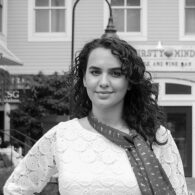Light Years
In our respective educational journeys as poets, we overlapped twice.
The first time was at our alma mater, a small historically women’s college in Massachusetts, where as a Pakistani and a Nepali American, we knew each other as “the other South Asian English major who writes poetry.” The second was at an MFA program in the Arizona desert. We kept exclaiming “What are the odds!” No longer merely “the other South Asian” to the other, this time we were determined to learn about, friend-chase, and yes, also impress each other. In one of Dure’s first classes in the program, our professor informed us that we must collaborate in groups or pairs to construct a response to Fred Moten’s all that beauty. There was no question that we had to work on it together.
In line with Moten’s thinking about undoing mastery while also engaging in study and collaboration, we decided to create, as per our initial text conversation about the idea, “a syllabus that goes on forever,” or, “a syllabus of exploration,” containing books and ephemera that resonated with us as writers, both around where we were and where we wanted to go. Our idea was that this would be a syllabus that would help us “not lose sight of goals in the midst of being tempted by capitalism and individuation” and that “instead of prescribing ourselves a resource for a certain purpose, asking ourselves: What purpose will it serve us?” In short, we were MFA students of color with lofty goals and something to prove.
Flash forward nearly four years later and we have not added anything to the syllabus since, despite our fervent assertions to do so. What do we make of this apparent broken promise to our past selves? We decided to visit them in the Google Doc syllabus that had gathered digital dust, and found them preserved in our marginalia and choices of texts. Revisiting the syllabus also allowed us to see what we were not saying. Only in the revisiting, years later, did we actually see the syllabus: the new understandings of ourselves and the texts we listed, that came to light only because of the years that passed.
We used annotations to reacquaint ourselves with this syllabus, responding to our past selves as well as to one another. In addition to annotating on our own, we hopped on a phone call which was not only playful and rambling but also spacious, enfolding necessary pauses. Our critical constellation fuses our syllabus annotations and conversation to paint a picture of who we were, who we are, and who we are allowing ourselves to be. Ultimately, we asked ourselves: does abandoning the syllabus mean we abandoned the work? Perhaps, we never stopped doing the work at all. Maybe we are asking more of ourselves than ever, but this time with gentleness.
Below are direct quotations from selections of the syllabus, along with annotations we made four years later. Quotes from the 2020 syllabus are in italics, with our annotations, made in 2024, below each quote.
***
“Moten made me think of lineage, collectivity, the power of reference, of recognizing I do not have to be lonely in my work. How much of the loneliness is self-imposed?” — Aria on all that beauty by Fred Moten
Dure: You were so right here—the power of reference is such a good way to put it. Whenever my mother makes certain jokes, she references the aunt or great aunt she heard it from first. Whenever she makes lamb chops, she talks about her mother-in-law whose recipe she uses. Against American racism, we do mythologize our own lineages.
Aria: We really do! My mother has a recipe that she always mentions comes from her sister-in-law. So much of this is an oral practice, too. I also find this sentence I wrote to be very inflated, though, perhaps like my ego was at the time. I felt like I was under some sort of microscope, constantly having to say something smart or critique my thoughts and feelings. I was doing my best to understand something, and noticing this effort can be a lovely, delicate thing, but it is also kind of embarrassing.
Criticism is empathic scarring.
Black thought is a feather brush of open switchblades.
Show me how to do like you.
— Fred Moten, “sembalance,” from all that beauty[1]
Aria: Reading through this syllabus reminded me of how when we read Fred Moten in class I connected to his ethos but did not enjoy reading his work itself—it was just jarring and difficult to follow. I remember our class sort of acknowledged that, but I also never felt comfortable voicing that thought in class explicitly. I don’t even think I knew how. I wonder what conversation would have opened up if I did. Maybe one in which we acknowledge that sometimes, we align with the artist’s vision but do not connect with the way they wield language, and I think that opens up rich conversations about the instrumentality of language, and how the way different writers channel that musicality will have different effects on readers. It also helps us consider the question of audience and whose ear a text’s instrumentality is calling or speaking to—it might not be for us, but we can still listen, learn, and read attentively.
Dure: I just love that you talk about how reading Moten’s book felt. Of course, the brain connects all his brilliance, academic arguments, and linguistic lineages and there is intellectual pleasure there. But you’re talking about the sensual, sensory joy of reading something that lets you in, or invites you. That brings me to the importance of sticking with something even though we don’t feel instantly rewarded by the reading experience. White people especially have to work through their unpleasant feelings to understand texts that don’t cater to them. On the other hand, as femmes of color, it was so hard for us even to acknowledge that the reading experience wasn’t fun. And now, as people who’ve been expected to smile through unpleasant dawats, putting up with obligations we don’t feel aligned to, just acknowledging the harshness of Moten’s text feels like such a feat! Ironically, I think we’d have engaged so much more deeply and lovingly with his work if we had.
***
“The secular should not be thought of as the space in which real human life gradually emancipates itself from the controlling power of ‘religion’ and thus achieves the latter’s relocation. It is this assumption that allows us to think of religion as ‘infecting’ the secular domain or as replicating within it the structure of theological concepts. …. Secularism doesn’t simply insist that religious practice and belief be confined to a space where they cannot threaten political stability or the liberties of ‘free-thinking’ citizens. Secularism builds on a particular conception of the world.” — Talal Asad, from Formations of the Secular[2]
“Read this for an anthropology class, and, for the first time ever, I was enlightened into critically challenging secular notions of independence, freedom of choice, and individualism. For the first time I saw how secularism is not a neutral thing just devoid of religion, but an ideology on its own. It made me existential because I believed in the goodness of secular liberalism. Want to hold on to this book forever.” — Dure on Formations of the Secular by Talal Asad
Dure: I know we both feel a sense of failure in not keeping up with updating this syllabus all the time as we thought we would—but now I feel good about it. The distance afforded space for reflecting on and acting on the syllabus—even when we were not consciously aware. For example, I had forgotten how much Asad’s Formations of the Secular meant to me. Recently, I had an acceptance come in for a poem with the line “secularism works like a religion too” (shout out Taco Bell Quarterly!). Asad would hate my oversimplification and disagree with me, but his work influenced me to unlearn the fact that secularism is a neutral ideology devoid of its own agendas. Now I have this documented proof that, four years ago, I added the book here. I was so entranced by the theory in this book—it led me to understand the world around me.
Aria: I love how you can trace this throughline between Talal Asad’s book, this syllabus, your poem, and its publication! I was about to say “and finally” its publication, but then chose not to because it is not an ending, or final, but rather a further opening and continuance of resonances, since from that point it is readers who do the noticing. This chain reaction speaks to how ideas get metabolized forever, and I love that your response to your past self in the syllabus is “documented proof” of this fact and a true tribute to the process.
***
“We stayed for hours as we asked for endless refills of bad coffee or ordered odd dishes off the menu. I wish I’d had a stenographer who followed me so I had transcripts of these quotidian moments that as a whole were more life-changing than losing your virginity or having your heart broken…When I made art alone, it was a fantasy, but shared with Erin and Helen, art became a mission.” — Cathy Park Hong, “An Education,” from Minor Feelings: An Asian American Reckoning[3]
“To praise a minor feeling. I feel out this new altar in the dark.” — Aria on Minor Feelings by Cathy Park Hong
Aria: My sentences feel overly sentimental and empty to me. I do not even feel embarrassment to my past self here, just unfamiliar. Maybe I will come back to this syllabus in another four years and think these annotations are bleak, who knows. But all I know right now is that my favorite essays in Minor Feelings were the ones about Cathy Park Hong’s turbulent female artists friendships (“An Education”) and about how she essentially harassed a Korean American therapist because she badly wanted to be her client (“United”). Those pieces just felt really lived-in to me and maybe that’s why they have stayed with me the longest.
Dure: I know the jaded feeling of ugh, that’s who I was or the absolute cringe at witnessing your transparent attempts to embody who you thought you should be, poet or MFA student or scholar or academic. But I also feel so much joy, and now I see the work we kept doing even as we didn’t update this actual syllabus. Just over the past few months, you sent me snippets of Emily Dickinson’s biography, which I found in my library and read. You also shared Austen’s juvenilia short stories, which we excitedly called “flash fic”! And, of course, all the conversations we have had about feminist praxis as people perceived as women in desi spaces. Your words are not inflated and empty. They are meaningful and intentional because we never stopped doing the work.
***
“And the adding of poems and checking in and reflections goes on forever :’) I love the notion of us adding to this throughout our time in the program and beyond <3 like every single page/section in this doc can just keep going, nothing is ever finished or closed” — Aria
Dure: Didn’t we get so much comfort in the last thing you wrote here? Nothing is ever finished or closed. We were surrounded by deadlines. The MFA would end. Well, it even feels like the world is ending all the time. It’s almost sacred—we were reaching for transcendence— permanence—with our work: collaborating in a joint effort to stay committed to learning. I don’t have much else to say. My body/mind is receiving this syllabus with tenderness for my past self and yours. I’m happy with how much we’ve done, but also struck by how much there is to keep working on.
Aria: Yes, I think it was really prescient of us to recognize that this syllabus needs to go on forever because the work is lifelong and dynamic. While annotating, it was lovely to return to some touchstones and find them to still be true, as well as recognize which texts and sources remain unexamined. I think that qualitative experience is quite true of syllabi: not every single text or thought will stick with you immediately, but what does will remain for so long. I find that it works similarly with the peers with whom you shared a class that go on to become friends—not everyone is meant to click with one another right away, but the connections that are eventually made will be so lasting, you might forget what it was like to exist without that other person’s presence and thoughts. I feel that way about whenever we get to connect in the midst of our hectic lives.
Dure: And it’s such a gift to have you to discuss my work and life with! I have told you this before, that going back to this syllabus actually made me feel very loved. You picked up a lot of my slack while I went through multiple life changes at the same time, and all your work to draw out depth from my scattered state of mind is becoming very clear and touching in retrospect.
Aria: I remember feeling a bit self-conscious around how much I added and pulled together, in a “oh no will Dure think I am too much?” kind of way. Yet I pushed past that insecurity because I was fascinated by your mind and wanted to learn from you! I felt like I was collaborating with you the entire time, even if you did not have the capacity to contribute as much arbitrarily, in terms of word count. I think the energy of what we were thinking and excitedly texting about was what motivated me first and foremost. The fact that you engaged with me so enthusiastically and fully when we were generating this idea was enough to let me know you really cared, and that we could be “too much” (a commonly internalized misogynistic phrase about neurodivergence!) together. We were on a similar wavelength from the start.
Dure: Over the years, we’ve also begun to be kinder to ourselves. This syllabus is so neurodivergent. It pulls from so many directions, and when it was “abandoned” we were actually doing work off the page, in our own neurodivergent ways. We always knew we were neurodivergent, but we knew it in a nagging sense, like something is wrong with me. Now, I think we recognize it more neutrally. We’re accepting things that don’t work for us. I look forward to how, with this new acceptance, we can continue to make space for our work. I’m so flattered, and grateful.
Our collaboration helped us travel to the future. In constellating with you, I’ve reached for things I do not have words for yet, and stepping back to watch the constellation we created allows a depth of reflection I would not have accessed otherwise. Much like how we see stars only years after they are born, I think we truly saw our syllabus only now, years later, in reflection.
[1] Fred Moten, “sembalance” in all that beauty (Denver: Letter Machine Editions, 2019).
[2] Talal Asad, Formations of the Secular: Christianity, Islam, Modernity (Palo Alto: Stanford University Press, 2003), 181.
[3] Cathy Park Hong, “An Education” in Minor Feelings: An Asian American Reckoning (New York: One World, 2020), 92-93.




Dilettante Mail
Get updates from us a few times a year.